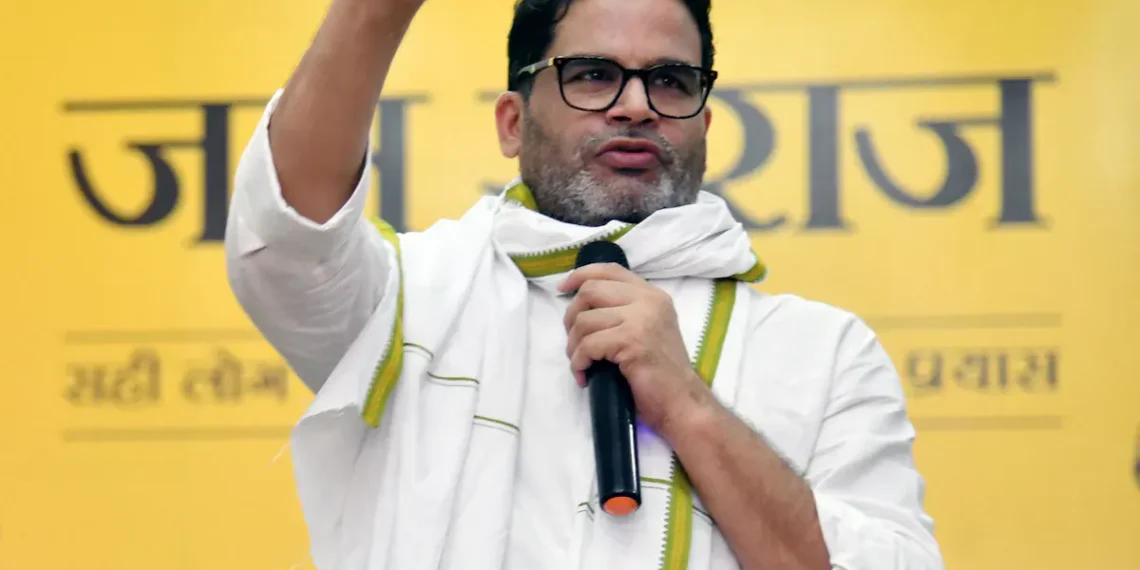In Bengal, Kishor’s address is the TMC headquarters at 121 Kalighat Road, while in Bihar, he’s enrolled in his native Rohtas district. The revelation comes amid the Election Commission’s nationwide voter roll cleanup, which removed over 68 lakh duplicate entries in Bihar alone.
BY PC Bureau
In a revelation that has sparked a fresh debate over the integrity of India’s voter rolls, poll strategist–turned–politician Prashant Kishor, now the founder of the Jan Suraaj Party and a key player in the upcoming Bihar Assembly elections, is registered as a voter in two separate states — West Bengal and Bihar.
The disclosure comes at a time when the Election Commission of India (ECI) is struggling to purge duplicate and invalid voter entries across states, amid growing concerns about electoral transparency ahead of a crowded election season.
Two States, Two Addresses
According to the Indian Express investigation, Kishor’s name features on the electoral rolls of West Bengal’s Bhabanipur Assembly constituency, where Chief Minister Mamata Banerjee contests. His registered address there is 121 Kalighat Road, the official headquarters of the Trinamool Congress (TMC).
That address is politically symbolic: it not only houses the TMC office but also lies within Banerjee’s political stronghold — the same Bhabanipur seat where Kishor had closely worked with the TMC as a political consultant during the 2021 West Bengal Assembly elections.
His polling booth in Bengal is listed as St. Helen School on B. Ranishankari Lane in south Kolkata.
Simultaneously, Kishor’s name also appears on Bihar’s voter list — this time under the Sasaram parliamentary constituency and Kargahar Assembly seat, with his polling station registered at Madhya Vidyalay, Konar, in Rohtas district. Konar happens to be Kishor’s ancestral village, where he has recently intensified his political outreach through the Jan Suraaj movement.
Kishor’s Team Responds: “Became Bihar Voter After Bengal Polls”
Kishor himself did not respond to multiple calls and messages from The Indian Express. However, a senior member of his team told the newspaper that Kishor became a registered voter in Bihar only after the 2021 Bengal elections.
The aide added that Kishor had applied to have his West Bengal voter card cancelled, but did not provide clarity on whether the cancellation process had been completed.
Bihar’s Chief Electoral Officer Vinod Singh Gunjiyal declined to comment when contacted by The Indian Express regarding the issue.
READ: Where’s Rahul? Congress’s Vanishing Act in Bihar Raises Big Questions
READ: Aditya Thackeray Exposes ‘Voter List Scam’, Flags 22,000 Fake Entries in Worli
Violation of Law or Clerical Overlap?
Under the Representation of the People Act, 1950, dual registration of voters is explicitly prohibited.
- Section 17 of the Act states: “No person shall be entitled to be registered in the electoral roll for more than one constituency.”
- Section 18 adds: “No person shall be registered more than once in the electoral roll of the same constituency.”
Once registered, an elector wishing to shift their voting location must submit Form 8 to the Election Commission to request a correction or change of residence.
However, instances of individuals being registered in multiple constituencies are far from uncommon. The EC itself, in a June 24 order, cited multiple registrations as one of the key reasons for launching a nationwide Special Intensive Revision (SIR) of electoral rolls, starting with Bihar.
The EC’s Cleanup Drive in Bihar
The Bihar SIR exercise concluded with the publication of updated electoral rolls on September 30, 2025, and resulted in the removal of over 68.66 lakh names from the state’s voter list.
According to officials, 7 lakh of these deletions were cases of individuals registered in more than one constituency. Yet, even after this sweeping review, duplicate entries may still remain, officials acknowledged.
The EC noted in its statement that many electors fail to delete their names from their previous constituency after relocating, “leading to an increased possibility of repeated entries in the electoral roll.”
The revelation that a public figure of Kishor’s prominence — someone who has publicly championed clean, data-driven politics — is caught in this very web of dual registration underscores the scale of the problem.
Local Voices Speak Out
Reacting to the report, Kajari Banerjee, councillor of Ward No. 73 in Bhabanipur and sister-in-law of Chief Minister Mamata Banerjee, confirmed that 121 Kalighat Road is indeed the TMC’s official address.
“He (Kishor) used to visit and stay in that building during his work with the TMC. I am not sure whether he enrolled as a voter from here or not,” Kajari Banerjee told The Indian Express.
The controversy, however, isn’t new. During the 2024 Lok Sabha elections, the CPI(M) had already raised objections to Kishor’s name being on the Bhabanipur voter list.
“We had written to the Election Commission, stating that Kishor is not a resident here and his name should therefore be removed from the voter list,” said Biswajit Sarkar, secretary of the CPI(M)’s Bhabanipur-2 area committee.
The revelation has political as well as symbolic consequences. Kishor, who once advised multiple parties including the BJP, Congress, JD(U), and TMC, has reinvented himself as a reformist politician through his Jan Suraaj movement — which has been sharply critical of entrenched corruption and bureaucratic inefficiency.
His party’s campaign narrative emphasizes “clean politics” and citizen participation, particularly in rural Bihar. The dual registration controversy risks denting that image, offering ammunition to rivals across the spectrum — from the BJP to the RJD — who may question Kishor’s moral authority to preach electoral reform.














